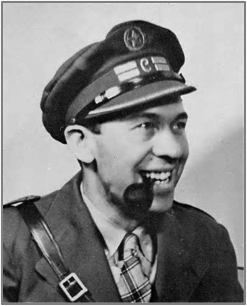
Merriman lets us know that he and Marion Merriman have now been married five years. Happy Anniversary! Merriman returned to camp to lecture. As we noted on prior pages, many of the troops were disgruntled for lack of repatriation opportunity but also for just the lack of leave. Harry Pollitt, head of the Communist Party of Great Britain received a note from an anonymous volunteer (signed “Salud, S___”):
many volunteers ‘feel downhearted at times’ and that certain issues ‘have caused hell among us’. Among these, it was being asked, ‘Why do officers eat separate and sleep on beds while we sleep on the ground?’ And rather more pointedly, ‘Why do some guys go to Albacete all the time and we don’t get leave?’ ¹
One begins to understand this comment when we see how often Merriman, Marcovics, Thompson and other officers are back and forth to Albacete. Merriman was back in Albacete on May 10, had a session in firing the new anti-tank 45mm gun and then ate with Marion, Marcovics and Roblet at the Intendencia. He met with Copic and Platone at the Guarda Nationale and then returned back to Pozorubio, taking Marion with him this time. Her anniversary present was to go see where her husband worked. Since Pozorubio was “top secret”, it must have been quite a treat.


Joe Dallet and Steve Nelson are now in Albacete and both will be involved in the setting up of the second American Battalion, called the Washington Battalion. The Nelson/Dallet group that came in from France were delayed by being jailed three weeks in France prior to being allowed to “leave France”, which they did across the Pyranees. Dallet reported the story in his memoir “Letters from Spain” (available at the link online). The Lincoln and Washington Battalions would have separate identities until the middle of the summer.
Ripples of the fighting with the Anarchists and POUM in Barcelona are being felt at Albacete. Platone expected trouble in Albacete, especially since large amounts of equipment and munitions are now arriving. Merriman is told that they will have to increase the guard in Albacete. Merriman says “more men should be here in Albacete”. This may not be just related to the guard situation. Arthur Timpson, who came into Spain during this week in 1937, relates:
About an hour later the truck stopped with a lot of voices about us. Then the back flap {of the truck} was pulled aside and someone with a very seamed face, topped by a leather cap, looked in, gave us a brief scrutiny, and closed the flap. I was sitting close to the rear and got a glimpse of a wall and a machine gun pointing carelessly in our general direction. Two more of the leather-capped men were with the gun. Our truck went ahead for another fifty yards. Then we got out. We were in an immense square with barrack-like buildings all around. There was the gate that we came through with two machine guns over the gate. A half dozen more of the leather caps were visible. None of them looked friendly. Someone, of the reception committee, I suppose, said “Anarchists. We are POWs.
And so it was that on May 6, 1937, I became a prisoner in the fortress of Figueras”…. ²
The interception of Internationales and their being held as “Prisoners of War” by the Anarchists in Figueras would have been a significant wake up call for the Brigade Staff in Albacete. Having their lifeline of new recruits cut off would have been most worrying. Timpson was held for a few days and released on to Albacete.
Merriman tells us that he is going on leave on May 11.
________________________________
¹ Richard Baxell, Unlikely Warriors: The British in the Spanish Civil War and the Struggle for Spain 1936-1939, ibid., pg 246. (from Comintern Archives 546/3/438/72)
² Arthur Timpson, “An Encounter with the Anarchists in Figueras” in Our Fight, Writings by Veterans of the Abraham Lincoln Brigade, SPAIN, 1936-1939, ibid., p 90.
